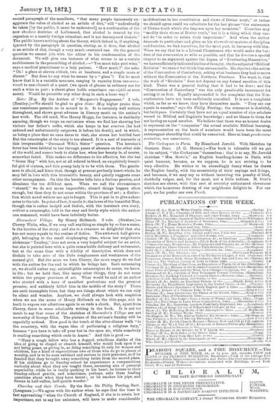is the heroine of the story; and she is a
creature so delightful that she has not many equals in the realms of fiction. The awkward, half-grown girl, belonging to the small shopkeeping class, whom her neighbours nickname "Tomboy," does not seem a very hopeful subject for an artist, but she is painted here with a quite remarkable delicacy and refinement, but at the same time with a fidelity of description which does not disdain to take note of the little ronghnesses and weaknesses of the natural girl. But the more we love Cherry, the more angry do we feel with the author for the end to which be brings her. Such unmeaning or, we should rather say, unintelligible catastrophes do occur, we know, in life ; but we hold that, like many other things, they do not come within the proper province of art. What would be said of an author who started with a hero of manifest perfections and the greatest promise, and suddenly killed him in the middle of the story ? There are such incomplete lives, but they are things about which we can only be silent and wonder. Anyhow, we shall always look with suspicion when we see the name of Henry Holbeach on the title-page, and be loath to expose our affections again to so rude a shock. But, apart from Cherry, there is some admieable writing in the book. It is not too
much to say that some of the sketches of Shoemaker's Village are not -unworthy of George Eliot. The picture of the artizan's Sunday will be
especially noticed. How good is the touch of the after-dinner walk "to the cemetery, with the vague idea of performing a religious duty," because "you have to take off your hat in the open air, while somebody is reading something which ends in Amen." And this is good :— " Many a rough fellow who has a dogged, rebellions dislike of the idea of going to chapel or church himself, who would look upon it as not being game, as giving in, as doing something fit only for women and children, has a kind of superstitious awe of those who do go to places of worship, and is to be seen subdued and serious in their presence, as if he fancied that they brought away something fetish from the sacred place. If his children go to Sunday-school he experiences a compunctions curiosity about what they are taught there, assuming airs of parental superiority, while be is really quaking in his heart, he listens to their 'Sunday-school prattle, and sometimes, perhaps, asks them leading questions about what they have learnt ; or he smokes his pipe, and listens in half-sullen, half-gentle wonder."


































 Previous page
Previous page